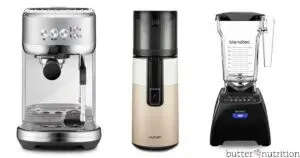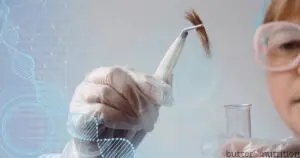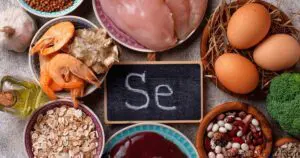
Multivitamins are no exception to this (read why here), so I thought I'd share my real food alternative, and what I consider to be a safer, more holistic and more bioavailable option.
You've probably heard about consuming organ meats, specifically liver for the nutritional benefits, which is justified as liver has a pretty stellar nutrition profile. But eating just liver misses the point of nose-to-tail eating. You're supposed to eat far more than just one organ. Exclusively eating liver as your organ meat staple also poses risk of nutrient excess due to its high vitamin A content, so I'm only a fan of using it in very small quantities in those without vitamin A overload risk (read: too much dairy, eggs, butter + vitamin A containing supplements).
Eating a wide variety of organ meats provides a vast array of real food nutrition, in just the right amounts and ratios as designed by nature. According to ancient wisdom "like supports like" when it comes to organ meats, meaning, consuming heart tissue supports heart health, kidney tissue consumption supports kidney function, and so forth.
So why are we paying high prices for inferior synthetic supplements when we could easily be getting the real thing from food?
Organ Meat Nutrition
Most organ meats are rich incredibly rich in B-vitamins, while some are also a great source of zinc, iron, copper, vitamin A and more.
So if you've ever struggled with...
...digestive issues
...hormonal imbalance
...low energy
...sleep issues
...fatigue
You can definitely benefit from getting more B-vitamins as well as the minerals organ meats supply into your diet.
So what does a more diverse organ meat rotation diet look like? Here's some organs you'll want to consider incorporating:
Kidney
Beef kidney tissue is a great source of vitamin B12 providing approximately 128% of your daily needs in a single one ounce serving. It's also rich in riboflavin or B2 (47% daily value), pantothenic acid or B5 (11% daily value), selenium (56% daily value), vitamin A (8% daily value) and iron (7% daily value). I see kidney as a real food B12 supplement, with a variety of other nutrients to boot. [1]
Kidney also contains the enzyme diamine oxidase (DAO) which helps to break down histamine in the body. This may be therapeutic to those with histamine intolerance as kidney can help naturally boost DAO levels. [11]
Heart
Beef heart tissue is an excellent source of B12 (40% daily value), selenium (9% daily value), iron (7% daily value), niacin (11% daily value), riboflavin or B2 (15% daily value), and copper (6% daily value). Heart tissue also contains naturally occurring coenzyme Q10, making heart a great way to get the nutrient naturally. [2]
Pancreas
Pancreas is a pancreatic enzyme powerhouse supplying amylase (to break down carbohydrates), protease (to break down proteins + peptides), and lipase (to break down fats). It's also a great source of vitamin B12 (77% daily value), pantothenic acid or B5 (13% daily value), riboflavin or B2 (8% daily value) and vitamin C (7% daily value). [3]
Pancreas is also said to contain large amounts of vitamin K2, which can be hard to come by in the standard American diet. [4]
Some alternative cancer doctors even use pancreatic enzymes in a special way as a part of their treatment plans. [5]
Bone Marrow
Bone marrow is where this gets fun.
Research shows bone marrow can be high in calcium, vitamin B2, iron and vitamin E. It also contains vitamin K2, although the exact amount is unclear. [6, 7]
Additional research shows bone marrow to contain the hormone called adiponectin, which, according to a study "helps maintain insulin sensitivity, break down fat, and has been linked to decreased risk of cardiovascular disease, diabetes, and obesity-associated cancers." [8]
Liver (caution: vitamin A toxicity)
A one ounce serving of beef liver contains abundant amounts of Vitamin A (95% daily value), B12 (277% daily value), riboflavin or B2 (45% daily value), niacin or B3 (18% daily value), pantothenic acid or B5 (20% daily value), B6 or pyridoxine (52% daily value), folate or B9 (20% daily value), zinc (7% daily value), copper (137% daily value), iron (8% daily value), selenium (16% daily value), and phosphorus (11% daily value). [9]
It's important not to overdo liver, especially if you are taking other sources of vitamin A like cod liver oil, multivitamins, and eat a lot of vitamin A-rich dairy.
From what I see in my clients, for most liver is not a good fit.
Spleen
Spleen tissue is incredibly high in iron, so I often call it nature's iron supplement. One ounce provides approximately 69% the RDA for iron, as well provides selenium (25% daily value), B12 (27% daily value), and vitamin C (21% daily value). Because the high amount of iron in spleen tissue, I'm typically only a fan of this for people who have lower iron levels confirmed by testing. This is because more iron in the diet is not better and can cause serious health concerns if you get too much. [10]
With all of these nutrients easily available in organ meats, why even bother with synthetic supplements? They're just not necessary in most cases.
Other Organs
Other larger organs like intestines, lung and brain can be therapeutic organs to include in an organ rotation diet, but they are harder to come by in the glandular world (at least without being cut with another organ, like liver, or other supplements). Much smaller organs such as hypothalamus (another one of my favorites), adrenal cortex, gallbladder, prostate, thyroid, and thymus are very powerful and often have specific uses.
These glandulars should be used under the supervision of a practitioner.
*Note: nutrition values are based on nutrition data available for 1 oz servings. Due to the natural variation of vitamins and minerals in organ tissue, you will never find nutrition facts on organ glandular supplement labels.
How to Use Glandular Supplements
While I know you're probably not a fan of actually eating these organ meats at your dinner table (bonus points if you do), you can find freeze dried organ tissue in capsules, commonly referred to as a glandular.
Side note — it's extremely important when choosing a glandular source to do your research on where the animal tissue comes from. Healthy and humanely treated animals = healthier organs and a better glandular product.
Glandular tissue supplements are the easiest way to get organs in your diet easily and consistently. They are also very reasonably priced, with the exception of some of the smaller organs in the body. They are more expensive because the glands are harder to come by.
My favorite way to incorporate tissue glandulars is twofold:
- Get some data on your body so you can find out what your body needs more of to thrive (I use hair analysis on myself and my clients). There are many cases where organ meats are NOT good for a particular client (especially with gut-liver axis issues).
- Choose a variety of organ meats that help fill in your known nutrition gaps. A typical glandular will contain about 500mg of glandular tissue per capsule, making 6 capsules or 3000mg roughly equivalent to 1 ounce of fresh organ meat. While I think 1 ounce of organ meat a day is a total overkill (and possibly harmful long term), I'm much more comfortable will a more conservative intake of around less than ½ of an ounce a day (mixed, not just liver or you'll get too much vitamin A over time). Organ glandulars are potent — and more is NOT better.
A common question I get is "what about organ complexes on the market?" I'm generally not a huge fan. Most of them have liver as the primary ingredient, which can pose problems if one is unsure of their nutrition status (namely iron and vitamin A) and/or taking a slew of other supplements containing these nutrients (what I call supplement stacking). Plus, they might already be eating a healthy diet high in these specific nutrients. I much prefer creating custom organ capsule combinations to target a person's specific needs.
Glandular therapy is powerful
Remember to go slow when getting started with glandulars. Start with one capsule and build up your ideal dosage slowly over several weeks as tolerated to avoid any side effects as your body gets used to this kind of potent nutrition.
Also be aware of toxicity that can happen with organ supplements, such as vitamin A toxicity particularly when using liver and kidney glandulars.
PIN IT:
References:
- https://nutritiondata.self.com/facts/beef-products/3466/2
- https://nutritiondata.self.com/facts/beef-products/3464/2
- https://nutritiondata.self.com/facts/pork-products/2200/2
- https://www.ncbi.nlm.nih.gov/pmc/articles/PMC6515216/#:~:text=Menaquinone%2D4%20(MK%2D4,with%20type%202%20diabetes%20mellitus.
- https://thegonzalezprotocol.com/research-efforts/history-enzyme-therapy/
- https://www.ncbi.nlm.nih.gov/pmc/articles/PMC3417664/
- https://pubmed.ncbi.nlm.nih.gov/18287355/
- https://www.sciencedaily.com/releases/2014/07/140703125216.htm
- https://nutritiondata.self.com/facts/beef-products/3468/2
- https://nutritiondata.self.com/facts/beef-products/3476/2
- https://academic.oup.com/ajcn/article/85/5/1185/4633007







Lin
Hi Catherine,
What do you recommend as a multi-mineral supplement, including both macro- and micro- minerals?
Thank you!
Catherine
I don't have a blanket recommendation for everyone, I tailor it based on hair analysis mineral testing.
Abundantly,
Catherine
Dawn Smith
could you please recommend where and what to get in a granular supplement.
Catherine
Hi Dawn,
I can't legally give specific advice to non-clients. Moreover, I'm seeing glandular supplements being overused and used in the wrong dietary context.
Abundantly,
Catherine